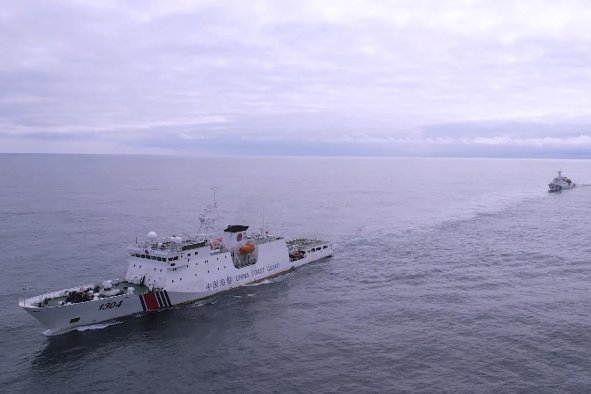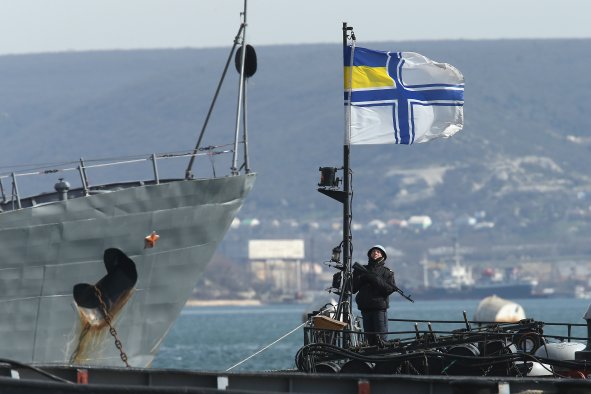The U.S. is in a "new nuclear age" and is set to change its approach to deal with the nuclear threats of Russia and China, the Pentagon has revealed.
A "more competitive approach" will be taken in the face of Russia potentially assembling a nuclear weapon in space and the growth in China's nuclear force, Acting Assistant Secretary of Defense for Space Policy Dr. Vipin Narang said.
The Pentagon official shared concerns about North Korea, which, while "not YET a nuclear peer" ... "continues to expand, diversify, and improve its nuclear, ballistic missile, and non-nuclear capabilities." On top of this, there is a "growing DPRK-Russia strategic partnership."
Narang warned it may soon be necessary to increase deployed forces and, under certain circumstances, even leave an international treaty.
He was speaking at the Center for Strategic and International Studies think tank in Washington D.C. on Thursday.
Defense officials, policy experts and representatives from multiple allied nations heard Narang break down the threats facing the world and outline the "three pillars" the United States' new "competitive approach" will be founded on.
Russia
On Russia, Narang said: "We learned that Russia is developing a new satellite designed to carry a nuclear weapon on orbit—an anti-satellite capability which, if detonated, could potentially wipe out an entire orbit of assets crucial not just to the United States, but the entire world.
"All of us should be concerned with the prospect of Russia putting a nuclear weapon in space, posing a threat to satellites operated by countries and companies around the globe, as well as to the vital communications, scientific, meteorological, agricultural, commercial, and national security services upon which we all depend.
"Make no mistake, even if detonating a nuclear weapon in space does not directly kill people, the indirect impact could be catastrophic to the entire world."
China
Narang went on to discuss China, the 2021 discovery of hundreds of new Intercontinental Ballistic Missile silos under construction in Western China, and the acceleration of its nuclear expansion which is predicted to leave China with more than 1,000 operational warheads by 2030.
"This expansion is being fueled by Russia—literally," he said, "as Moscow supplies China with Highly Enriched Uranium reactor fuel, which supports the production of weapons-grade plutonium."
Narang said: "The growth in, and diversification of, the Chinese nuclear force—something we neither anticipated nor accounted for when we crafted the nuclear modernization program over a decade ago—will be a defining feature of this new nuclear age."
North Korea
The Pentagon official said the U.S. "can't sleep on North Korea" and the growth in its weapons program, especially considering its partnership with Russia, which he believes "illustrates the real possibility of collaboration and even collusion between our nuclear-armed adversaries."
The new approach, he suggested, is based firstly on the principle of fielding "a modern nuclear deterrent" that can "deter strategic attack, assure our allies and partners, and meet our objectives if deterrence fails."
The second pillar is to "strengthen our network of allies and partners and our extended deterrence efforts in NATO and the Indo-Pacific."
Third, Narang called for more investment in the next generation of talent and leaders "to guide our strategic thinking and shape our future infrastructure and capabilities in this era of competition."
The Pentagon official said that, unless the nuclear trajectories of Russia, China and North Korea change," we may reach a point where a change in the size or posture of our current deployed forces is necessary."
"Only the President can make that decision," he added.
Future of U.S.-Russia Nuclear Treaty
He also spoke about the New START treaty, a nuclear arms reduction deal between the U.S. and Russia that was signed in 2010, which limits both countries to 1,550 deployed nuclear warheads and 700 deployed missiles and bombers.
Narang hinted at abandoning the treaty if Russia did not fall in line with it, and urged the country to prepare to do so.
He said: "We will also abide by the central limits of New START for the duration of the Treaty, as long as we assess that Russia continues to do so. But in an uncertain world, preserving the option to change course tomorrow requires that we make necessary decisions and investments today."
Throughout his speech, Narang stressed that the U.S. would not rise to nuclear competition proactively, but as a response to Russia, China and North Korea.
He said: "Let me be clear: competition is not a foregone conclusion—if our adversaries make different choices, so will we. But so far, they have not, and show no interest in doing so. So, if our adversaries continue down their current paths, the United States – alongside our allies and partners – is ready, willing, and able to confront the challenges of a new nuclear age."
Disclaimer: The copyright of this article belongs to the original author. Reposting this article is solely for the purpose of information dissemination and does not constitute any investment advice. If there is any infringement, please contact us immediately. We will make corrections or deletions as necessary. Thank you.




